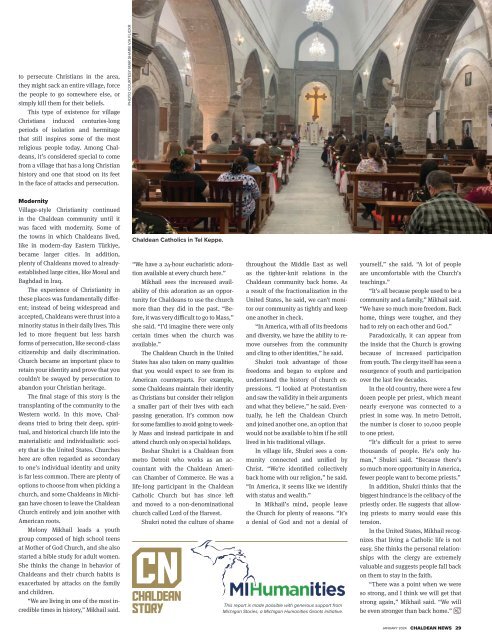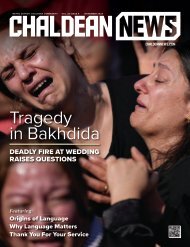You also want an ePaper? Increase the reach of your titles
YUMPU automatically turns print PDFs into web optimized ePapers that Google loves.
to persecute Christians in the area,<br />
they might sack an entire village, force<br />
the people to go somewhere else, or<br />
simply kill them for their beliefs.<br />
This type of existence for village<br />
Christians induced centuries-long<br />
periods of isolation and hermitage<br />
that still inspires some of the most<br />
religious people today. Among Chaldeans,<br />
it’s considered special to come<br />
from a village that has a long Christian<br />
history and one that stood on its feet<br />
in the face of attacks and persecution.<br />
PHOTO COURTESY MAR SHARB VIA FLICKR<br />
Modernity<br />
Village-style Christianity continued<br />
in the Chaldean community until it<br />
was faced with modernity. Some of<br />
the towns in which Chaldeans lived,<br />
like in modern-day Eastern Türkiye,<br />
became larger cities. In addition,<br />
plenty of Chaldeans moved to alreadyestablished<br />
large cities, like Mosul and<br />
Baghdad in Iraq.<br />
The experience of Christianity in<br />
these places was fundamentally different;<br />
instead of being widespread and<br />
accepted, Chaldeans were thrust into a<br />
minority status in their daily lives. This<br />
led to more frequent but less harsh<br />
forms of persecution, like second-class<br />
citizenship and daily discrimination.<br />
Church became an important place to<br />
retain your identity and prove that you<br />
couldn’t be swayed by persecution to<br />
abandon your Christian heritage.<br />
The final stage of this story is the<br />
transplanting of the community to the<br />
Western world. In this move, Chaldeans<br />
tried to bring their deep, spiritual,<br />
and historical church life into the<br />
materialistic and individualistic society<br />
that is the United States. Churches<br />
here are often regarded as secondary<br />
to one’s individual identity and unity<br />
is far less common. There are plenty of<br />
options to choose from when picking a<br />
church, and some Chaldeans in Michigan<br />
have chosen to leave the Chaldean<br />
Church entirely and join another with<br />
American roots.<br />
Melony Mikhail leads a youth<br />
group composed of high school teens<br />
at Mother of God Church, and she also<br />
started a bible study for adult women.<br />
She thinks the change in behavior of<br />
Chaldeans and their church habits is<br />
exacerbated by attacks on the family<br />
and children.<br />
“We are living in one of the most incredible<br />
times in history,” Mikhail said.<br />
Chaldean Catholics in Tel Keppe.<br />
“We have a 24-hour eucharistic adoration<br />
available at every church here.”<br />
Mikhail sees the increased availability<br />
of this adoration as an opportunity<br />
for Chaldeans to use the church<br />
more than they did in the past. “Before,<br />
it was very difficult to go to Mass,”<br />
she said. “I’d imagine there were only<br />
certain times when the church was<br />
available.”<br />
The Chaldean Church in the United<br />
States has also taken on many qualities<br />
that you would expect to see from its<br />
American counterparts. For example,<br />
some Chaldeans maintain their identity<br />
as Christians but consider their religion<br />
a smaller part of their lives with each<br />
passing generation. It’s common now<br />
for some families to avoid going to weekly<br />
Mass and instead participate in and<br />
attend church only on special holidays.<br />
Beshar Shukri is a Chaldean from<br />
metro Detroit who works as an accountant<br />
with the Chaldean American<br />
Chamber of Commerce. He was a<br />
life-long participant in the Chaldean<br />
Catholic Church but has since left<br />
and moved to a non-denominational<br />
church called Lord of the Harvest.<br />
Shukri noted the culture of shame<br />
CHALDEAN<br />
STORY<br />
throughout the Middle East as well<br />
as the tighter-knit relations in the<br />
Chaldean community back home. As<br />
a result of the fractionalization in the<br />
United States, he said, we can’t monitor<br />
our community as tightly and keep<br />
one another in check.<br />
“In America, with all of its freedoms<br />
and diversity, we have the ability to remove<br />
ourselves from the community<br />
and cling to other identities,” he said.<br />
Shukri took advantage of those<br />
freedoms and began to explore and<br />
understand the history of church expressions.<br />
“I looked at Protestantism<br />
and saw the validity in their arguments<br />
and what they believe,” he said. Eventually,<br />
he left the Chaldean Church<br />
and joined another one, an option that<br />
would not be available to him if he still<br />
lived in his traditional village.<br />
In village life, Shukri sees a community<br />
connected and unified by<br />
Christ. “We’re identified collectively<br />
back home with our religion,” he said.<br />
“In America, it seems like we identify<br />
with status and wealth.”<br />
In Mikhail’s mind, people leave<br />
the Church for plenty of reasons. “It’s<br />
a denial of God and not a denial of<br />
This report is made possible with generous support from<br />
Michigan Stories, a Michigan Humanities Grants initiative.<br />
yourself,” she said. “A lot of people<br />
are uncomfortable with the Church’s<br />
teachings.”<br />
“It’s all because people used to be a<br />
community and a family,” Mikhail said.<br />
“We have so much more freedom. Back<br />
home, things were tougher, and they<br />
had to rely on each other and God.”<br />
Paradoxically, it can appear from<br />
the inside that the Church is growing<br />
because of increased participation<br />
from youth. The clergy itself has seen a<br />
resurgence of youth and participation<br />
over the last few decades.<br />
In the old country, there were a few<br />
dozen people per priest, which meant<br />
nearly everyone was connected to a<br />
priest in some way. In metro Detroit,<br />
the number is closer to 10,000 people<br />
to one priest.<br />
“It’s difficult for a priest to serve<br />
thousands of people. He’s only human,”<br />
Shukri said. “Because there’s<br />
so much more opportunity in America,<br />
fewer people want to become priests.”<br />
In addition, Shukri thinks that the<br />
biggest hindrance is the celibacy of the<br />
priestly order. He suggests that allowing<br />
priests to marry would ease this<br />
tension.<br />
In the United States, Mikhail recognizes<br />
that living a Catholic life is not<br />
easy. She thinks the personal relationships<br />
with the clergy are extremely<br />
valuable and suggests people fall back<br />
on them to stay in the faith.<br />
“There was a point when we were<br />
so strong, and I think we will get that<br />
strong again,” Mikhail said. “We will<br />
be even stronger than back home.”<br />
<strong>JANUARY</strong> <strong>2024</strong> CHALDEAN NEWS 29
















